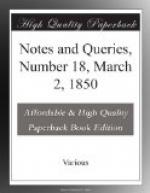“Give us this day good hearts, good
enemies,
Good blows on both sides, wounds that
fear or flight
Can claim no share in; steel us both with
anger,
And warlike executions fit thy viewing.
Let Rome put on her best strength, and
thy Britain,
Thy little Britain, but as great in fortune,
Meet her as strong as she, as proud, as
daring!
And then look on, thou red-eyed God; who
does best,
Reward with honour; who despair makes
fly,
Unarm for ever, and brand with infamy!”
C.I.R.
Feb. 16.
To endeavour oneself (No. 8. p. 125.).—“G.P.” thinks that the verb “endeavour” takes a middle voice form in the collect for the second Sunday after Easter, in the preface to the Confirmation Service, and in the Form of Ordering of Priests: but in these instances is it any thing more than the verb neuter, implying that we should endeavour ourselves to follow, &c.?
In Shepherd’s Elucidation of the Book of Common Prayer (2 vols. 8vo. Lord. 1817), under the head of the Confirmation Office, it is stated relative to the persons to be confirmed (vol. ii. p. 312.), “that they solemnly engage evermore to endeavour faithfully to perform their part of that covenant.”
C.I.R.
Evelyn’s Sculptura.—In a copy of Evelyn’s Sculptura, 3rd edit., with Memoir of the Author’s Life, 8vo. London, 1759, I find the following memorandum, in pencil, prefixed to the Memoirs:
“By Dr. Warton of Winchester,
as he himself informed me in
1785.”
An autograph resembling “J. Chelmar” is on the fly-leaf. As I do not see this Memoir ascribed to Dr. Warton in any list, to which I have access, of his writings, perhaps the Memoir is not generally, or at all, known to be by him, and I therefore send the memorandum to you to be winnowed in your literary threshing-floor, by those who have better means and more leisure to ascertain its value.
J.M.
Oxford, Feb. 5.
William Baxter.—I do not know whether William Baxter is authority for anything. When you see a word quoted from one of the languages or dialects which the moderns call Celtic, that word will very commonly be found not to exist. When at a loss, quote Celtic. If W. Baxter says (see No. 13. p. 195.) that buarth papan means the sun’s ox-stall, or, in other words, that papan means the sun, I should wish to know where else such a name for that luminary, for or any thing else, may be met with? I have not found any such thing.
A.N.
Derivation of the word “Avon."—Among the many proofs of the prevalence of the Gaelic roots in existing names at both ends of the island, it may be mentioned that there are ten rivers named Avon in Britain, and Avon is simply the Gaelic word for a river.
J.U.G. Gutch.




